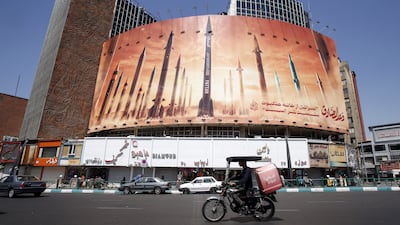The long distance of 2,500km did not stop the Iranian drones and missiles from reaching Israeli skies. But what if, instead, the target had been much closer – say, a neighbouring Arab state?
Iran's last major war was in the 1980s, against Saddam Hussein’s Iraq. Since then, Tehran has focused on expanding its influence by building up arms at home and proxies abroad.
The unprecedented and direct attack on Israel breached that norm and pushed Iran's ability to threaten the country from the shadows into the daylight. It unmasked, for the first time, a segment of its military strength and capabilities to the region and the world.
More significantly, it underscored a warning that many Arab states have long voiced to western leaders: Iran's advancement in drone and ballistic missile technology poses an escalating danger.
In the 2019 strikes on Saudi Aramco facilities, the 2022 drone attacks against the UAE and in countless instances of bombings and violence in Lebanon, Iraq, Syria and Yemen, Iran's direct hand has been invisible.
Yet, since the Hamas attacks on Israel on October 7 and the start of Israel’s devastating war in the Gaza Strip, Tehran has intensified operations through its axis of proxy militant groups, all of which are operating to various degrees to exert pressure on Israel to cease its assault on the enclave.
Middle East officials and militants have told The National that those armed factions established a daily co-ordination process through a joint command after the war broke out, mainly focused on picking up targets and the timings of attacks against Israel and US forces in the region.
Tehran's covert involvement in this process made its elite Quds Force commanders targets in Lebanon and Syria. Over the past six months, it has lost some of its highest-ranking regional commanders and operatives there in Israeli airstrikes.
Behind the scenes, however, there were some efforts towards de-escalation. Iran has been engaged in indirect negotiations with the US to extend an unofficial truce in Iraq to other conflict areas of the Middle East. During these discussions, Tehran aimed to leverage concessions from Washington that might result in the release of billions of dollars in its accounts that are currently frozen due to sanctions linked to its nuclear programme.
Then came the Israeli attack on the embassy compound, compelling it to abandon its “savoir faire” strategy, as described by one regional security source, and respond directly, aiming to maintain its regional and domestic standing and preserve its deterrent status against Israel, which seemed to have chosen a limited retaliation on Friday by discreetly striking a military site in Iran.
By doing so, the Iranian regime has finally put its Hulk-like side on display, and the sight of dozens of missiles and drones crossing the airspace of three countries starkly revealed the threat that many Arab states have long cautioned against.
Tehran knew. It swiftly realised the negative impact on its standing among neighbouring nations highly focused on building bridges and economic prosperity, and embarked on a diplomatic spree to try to limit the damage.
Suddenly, past calls from Gulf and Arab nations for Iran's ballistic missile program and other advanced military capabilities to be included in nuclear negotiations seem more warranted than ever. And their efforts to forge military alliances with partners beyond the US to protect their territories appear more logical.


